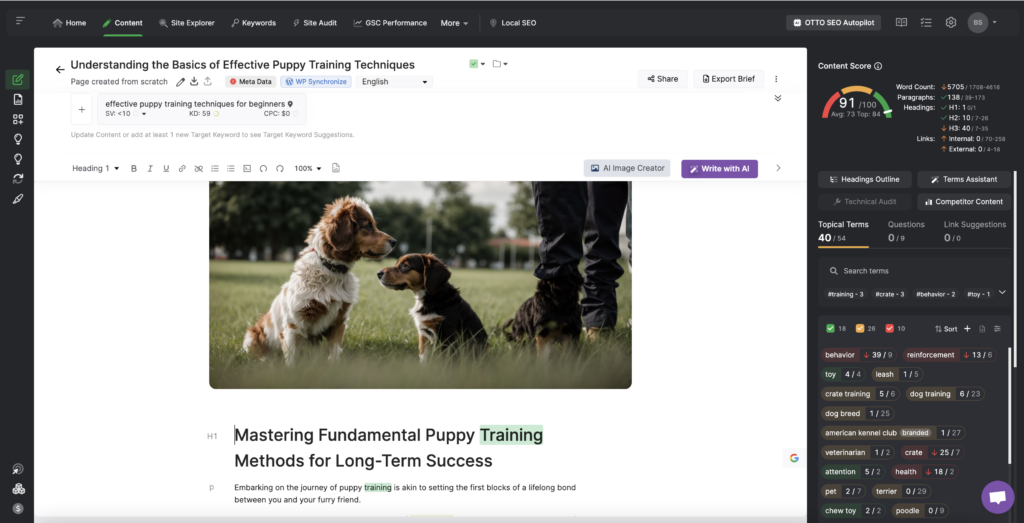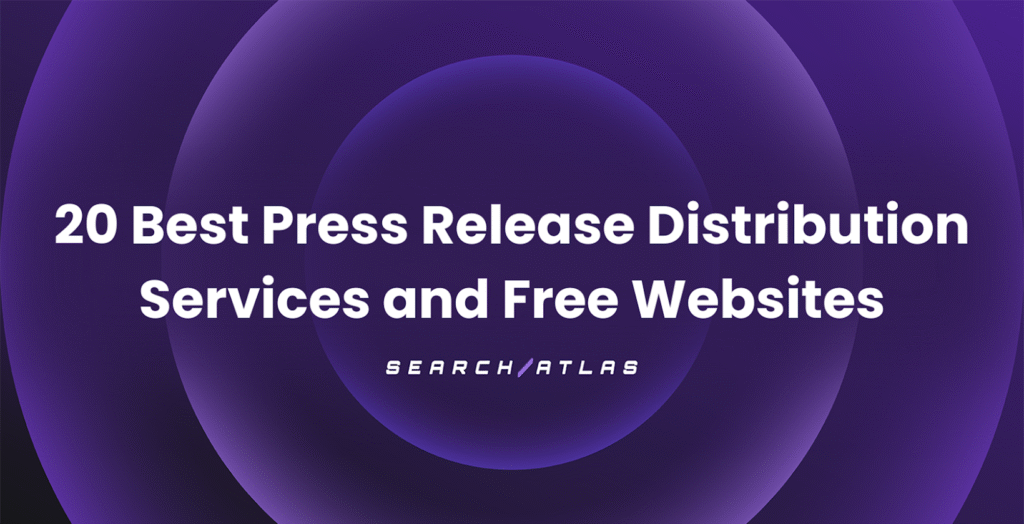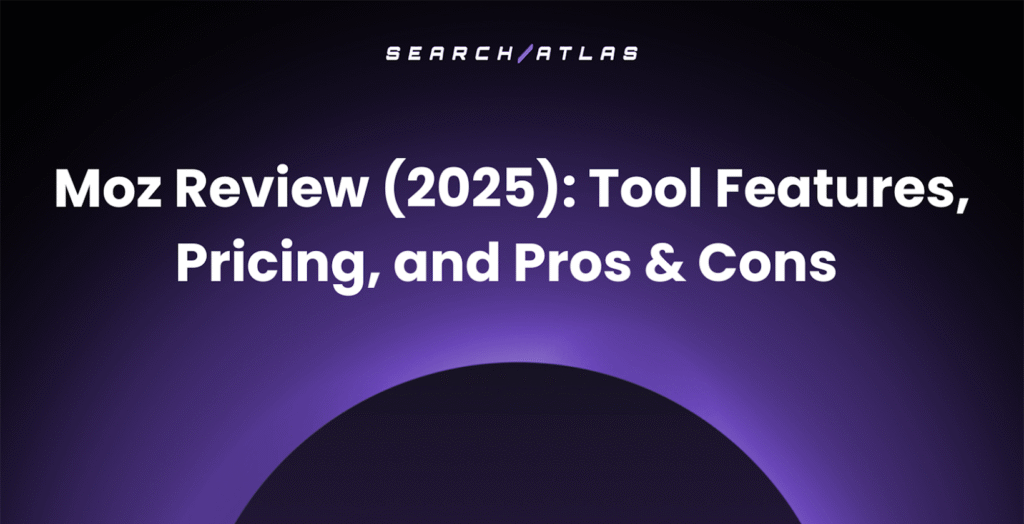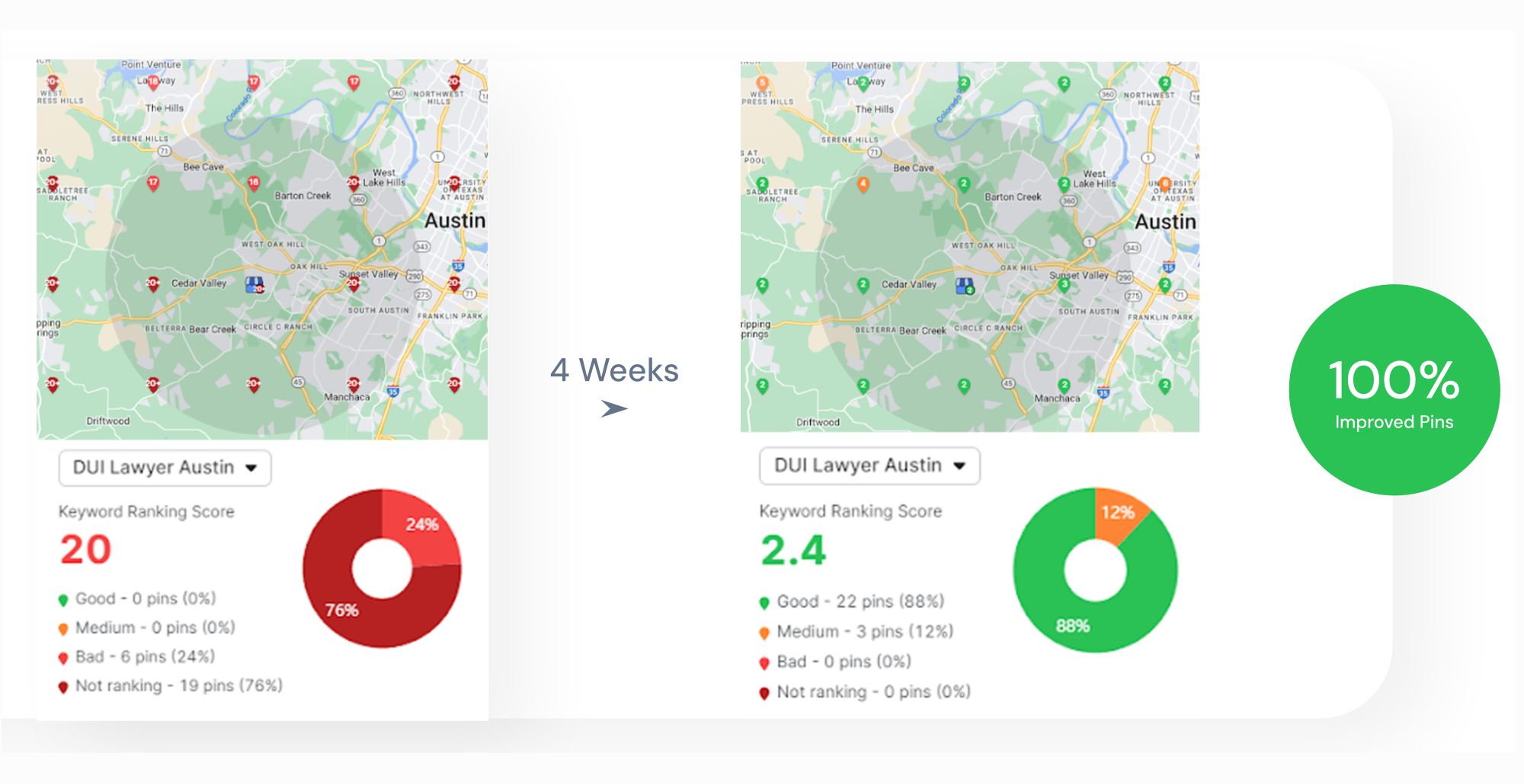Keyword research is the strategic process of discovering the exact words and phrases your target audience types into search engines. Keyword research serves as the foundation of SEO (Search Engine Optimization) and PPC (Pay-Per-Click) strategies by aligning digital content with user intent, improving visibility, and driving targeted traffic.
Digital marketing efforts without keyword research lack direction, making it nearly impossible to rank in search results or maximize ad performance.
Keyword research determines how businesses position themselves in search engines. Practical keyword research in SEO involves understanding keyword relevance, keyword difficulty, search volume, search intent, and SERP structure to target queries with the highest potential return.
Best practices for keyword research include defining your goals and target audience, segmenting keywords by search intent, grouping keywords into themes, and continuously updating keyword strategies based on performance metrics and search trends.
Whether optimizing for organic search or paid advertising, following a thorough keyword research guide enhances discoverability, improves click-through rates, and leads to higher conversions.
What is Keyword Research?
Keyword research identifies and analyzes search terms people use when looking for information, products, or services online. Keyword research helps marketers understand the language their target audience uses when searching online. The process of keyword research removes the guesswork, as it uses the search volume, keyword difficulty, and search intent to identify the most valuable SEO and PPC terms.
SEO keyword selection requires evaluating metrics to determine which terms offer the potential for driving qualified traffic to your website. Finding SEO keywords involves using specialized tools to discover search terms related to your niche, analyzing competitor strategies, and understanding search patterns within your industry.
Effective keyword research uncovers the relationships between words, phrases, and topics that represent valuable opportunities for content creation and optimization. By examining how people search (including the questions they ask, the language they use, and the solutions they seek), businesses can align their content strategy with actual user intent rather than assumptions about what matters to their audience.
What is Keyword Research in the Overall SEO Strategy?
Keyword research is the first step in developing an SEO strategy, delivering the foundation for all other optimization efforts, such as on-page SEO and SEO content creation. Within the SEO framework, researching keywords for SEO helps identify the specific terms and phrases that connect user intent with website content.
In the overall SEO strategy, keyword research impacts virtually every optimization aspect – on-page SEO, content SEO, technical SEO, and off-page SEO.
- On-page elements like title tags, meta descriptions, and headings are refined based on keyword insights.
- Content calendars develop around keyword themes to build topical authority.
- Technical SEO decisions, including URL structure and internal linking patterns, follow keyword hierarchy.
- Off-page strategies like link-building target specific keyword priorities.
Thorough keyword analysis will help you understand how users navigate their customer journey through search, which topics are gaining momentum, and where competitors might be vulnerable.
The most successful Search Engine Optimization strategies use keyword research as an ongoing process of refinement and expansion that evolves with changing market conditions, algorithm updates, and business objectives.
What is Keyword Research in Digital Marketing?
Keyword research in digital marketing gives the strategic framework for connecting with potential customers across multiple channels. Keyword research in digital marketing informs content marketing, social media, email campaigns, and paid advertising strategies by revealing the specific language and topics that resonate with target audiences.
Successful digital marketing campaigns use keyword insights to create cohesive messaging that addresses user needs at different customer journey stages.
For PPC keyword research specifically, the process focuses on identifying terms with commercial intent that can drive conversions while maintaining a positive return on ad spend. Unlike SEO, which often incorporates informational queries into a broader content strategy, PPC campaigns typically target keywords that indicate a readiness to take action.
The relationship between organic and paid keyword strategies within digital marketing is increasingly synergistic. Data from PPC campaigns can validate keyword opportunities before committing to long-term SEO investments, while organic content performance can identify new terms to incorporate into paid campaigns. The integrated approach to keyword research ensures maximum visibility across all digital marketing channels and provides multiple touchpoints for engaging potential customers.
What is the Importance of Keyword Research?
Keyword research is important because it connects businesses with their target audience at the precise moment users express interest or intent through search. Keyword research reveals exactly what language customers use when looking for solutions, products, or information online.
Without a proper keyword research strategy, businesses risk creating content that misses the mark entirely, preventing potential customers from ever discovering their offerings, regardless of quality or relevance.
Keyword research provides critical market intelligence by uncovering patterns in search behavior that reflect consumer needs, interests, and pain points. Query insights help shape content creation, product development, and overall marketing strategies that are aligned with actual customer demand.
By analyzing search volume trends, businesses can identify seasonal patterns, emerging interests, and shifting market demands that might otherwise remain hidden.
Strategic keyword selection directly influences conversion rates by attracting visitors with specific intentions that match business offerings. Additionally, keyword research identifies gaps in the market where competition is low but search interest is high, creating opportunities for businesses to establish authority in underserved areas.
One of the biggest benefits of keyword research is improved resource allocation by focusing content creation and optimization efforts on terms with the highest potential return on investment.
What are the 5 Essential Elements of Keyword Research?
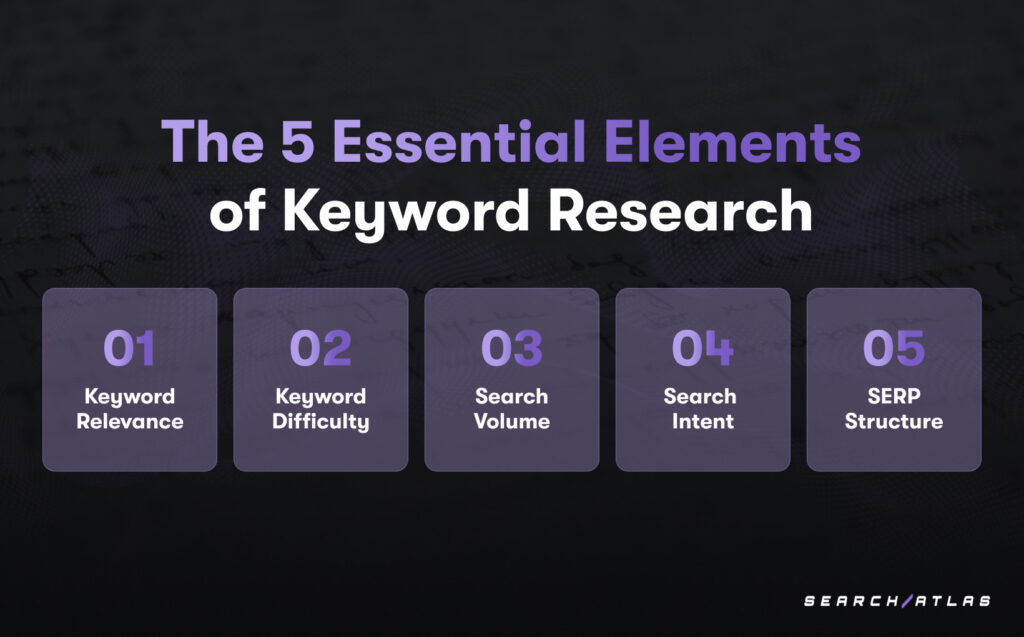
The 5 essential elements of keyword research are keyword relevance, keyword difficulty, search volume, search intent, and SERP structure. The essential elements of keyword research analysis work together to identify the most valuable search terms for both SEO and PPC campaigns. The keyword metrics derived from analyzing keyword research elements influence content development, on-page optimization, and paid advertising strategies.
1. Keyword Relevance
Keyword relevance measures how closely a search term aligns with your website’s content, offerings, and the needs of your target audience. Relevant keywords connect user queries with pages that satisfy their search intent, creating a natural match between what people seek and what your site provides. Search engines prioritize this alignment to deliver the most useful results to users, making keyword relevance a fundamental factor in both organic rankings and paid advertising quality scores.
The importance of keyword relevance cannot be overstated. Targeting irrelevant keywords might temporarily increase traffic but will ultimately lead to high bounce rates, poor engagement metrics, and diminished search visibility as algorithms detect the mismatch between user intent and page content. Conversely, highly relevant keywords attract qualified visitors who are more likely to engage with content, convert, and establish positive user signals that reinforce search rankings over time.
2. Keyword Difficulty
Keyword difficulty (KD) indicates how challenging it will be to rank for a specific search term in organic results, typically measured on a scale of 0-100, with higher numbers representing greater competition. This metric takes into account factors such as the domain authority, content quality, and backlink profiles of currently ranking pages to estimate the effort required to achieve similar positioning. Understanding keyword difficulty helps marketers identify realistic targets based on their site’s competitive strengths and available resources.
For new websites or those with limited authority, focusing on lower-difficulty keywords creates opportunities to gain traction in search results while building domain power. These terms often include long-tail phrases (containing three or more words), niche topics, or geographically specific variations that face less competition from established sites. As domain authority increases through consistent content creation and link building, progressively more competitive keywords become viable targets for optimization.
3. Search Volume
Search volume (SV) represents the average number of times a keyword is searched for in a given period, typically measured monthly. Search volume provides crucial insight into potential traffic opportunities and user interest levels across different search terms. High search volume indicates search demand and popularity, but often correlates with higher competition. Lower-volume terms may offer easier ranking opportunities with more targeted audience potential.
Monthly search volume data helps prioritize keyword targets based on traffic potential, though it should never be considered in isolation. Seasonal fluctuations can dramatically affect search patterns for certain industries, making historical trend analysis essential for accurate forecasting. Even relatively low-volume keywords can deliver significant value when they indicate high purchase intent or address specific customer needs that align closely with business offerings.
When analyzing search volume, consider the total potential traffic across related keyword clusters rather than focusing exclusively on individual terms. This approach to search volume acknowledges the reality that pages typically rank for dozens or hundreds of related queries beyond their primary target keywords.
4. Search Intent
Search intent identifies the primary goal behind a user’s search query, categorized as informational (seeking knowledge), navigational (looking for a specific brand), commercial (researching products or services), or transactional (ready to make a purchase or take action). Understanding search intent allows marketers to create content that precisely matches what users expect to find when entering a specific query, improving both engagement metrics and conversion potential.
Google’s algorithms have become increasingly sophisticated at determining intent, with search results tailored to match the implied purpose behind queries even when the intent isn’t explicitly stated. The power of semantics in search is what makes understanding intent possible. This evolution of semantic search means that ranking successfully requires not just matching keywords but delivering content that fulfills the specific need driving the search. For example, a query like “best running shoes” displays primarily review and comparison content, while “buy running shoes” returns e-commerce product pages, reflecting different underlying intents.
5. SERP Structure
SERP (Search Engine Results Page) structure analysis examines the layout and features appearing on the search results page for specific keywords. SERP structure includes elements like featured snippets, organic blue links, People Also Ask (PAA) boxes, knowledge panels, image carousels, shopping results, and local packs. These features significantly impact organic click-through rates and visibility opportunities, making them crucial considerations when prioritizing keyword targets and formatting content for maximum visibility.
Different query types trigger different SERP features, with search engines customizing results based on perceived user needs. Understanding which features appear for target keywords reveals additional optimization opportunities beyond traditional organic listings. For example, content can be structured to win featured snippets by directly answering common questions or local SEO elements can be strengthened when keywords trigger map packs in results.
SERP analysis reveals competitive dynamics that aren’t apparent from keyword metrics alone. Some queries may show fewer than ten organic results due to expanded SERP features, increasing competition for remaining positions. Keywords with rich results like featured snippets may offer visibility opportunities even for pages ranking below position one.
Incorporating SERP structure analysis into keyword research allows marketers to identify opportunities where specific content formats or optimization approaches could yield disproportionate visibility despite competitive keyword difficulty scores.
How to Do Keyword Research for SEO?

Keyword research for SEO identifies valuable search terms while analyzing their potential for driving relevant traffic and conversions. Implementing established keyword research best practices allows thorough discovery of opportunities while maintaining focus on terms with genuine business value.
To do keyword research for SEO, follow the step-by-step process outlined below.
1. Define Your Goals and Target Audience
Defining your goals and target audience begins by establishing clear objectives for your SEO strategy, whether that’s increasing sales, generating leads, building brand awareness, or educating your audience. These goals will guide your keyword selection toward terms that support specific business outcomes rather than simply driving generic traffic. For example, e-commerce sites prioritize product-specific terms with purchase intent, while content publishers might focus on informational queries that build audience engagement.
Understanding your target audience is equally crucial for effective keyword research. Develop detailed buyer personas that include demographic information, challenges, motivations, and the specific language these individuals use when searching online.
Your audience knowledge helps identify relevant keyword opportunities that might be missed when focusing exclusively on industry jargon or technical terminology. Consider how different audience segments might use varied search language based on their knowledge level, from beginners using basic terms to experts employing specialized vocabulary.
The intersection of business goals and audience needs defines the most valuable keyword territory. For each potential keyword opportunity, ask, “Does this search term represent someone who might benefit from our offerings?” and “Does attracting this traffic support our business objectives?” This focused approach ensures that SEO efforts drive visibility and meaningful engagement with prospective customers at appropriate stages in their journey.
2. Generate Seed Keywords
Seed keywords are the center of your keyword research. Seed keywords are the core terms that describe your products, services, or content topics in their simplest form. These broad, typically short phrases are starting points for discovering more specific and varied keyword opportunities.
Generate seed keywords by listing the main categories, products, services, and topics central to your business or industry. To expand your seed keyword list, incorporate multiple perspectives by following the tips listed below.
- Asking team members across departments how they would search for your offerings.
- Reviewing industry publications, forums, and competitor sites for relevant terminology.
- Examining your website analytics to identify terms already driving traffic.
- Listing common problems your products or services solve from the customer’s perspective.
You can use Google Keyword Planner to identify baseline terms within your industry by entering your website URL or general business category. Review your Google Search Console data to find terms already driving traffic to your site and examine Google Trends to identify popular topics and rising search terms in your industry.
The Search Atlas Keyword Magic Tool streamlines the whole process by automatically generating related keyword ideas when you enter even basic seed terms. The Search Atlas Keyword Magic Tool, as an AI-powered feature, quickly identifies semantically related concepts, alternative phrasing, and topic associations that might be overlooked in manual brainstorming.
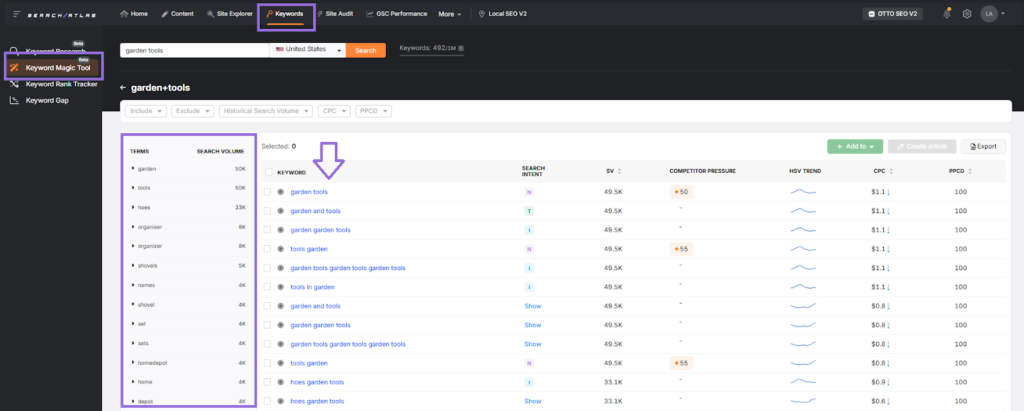
The tool displays keyword variations in an organized structure that helps identify potential content themes and topic clusters for further development.
3. Expand Your Keyword List
Once you have established your seed keywords, expand your list by discovering related terms, questions, and variations that potential customers might use. This expansion phase uncovers the full range of search language surrounding your topics, including the ones listed below.
- Long-tail keywords (longer, more specific phrases with lower competition)
- Questions (who, what, where, why, how, when)
- Related topics and subtopics
- Alternate phrasing and synonyms
- Common modifiers (best, top, cheap, near me, etc.)
Use Google Autocomplete by typing your seed keywords and noting suggestions that appear in the search bar. In addition, check Google’s “Related Searches” at the bottom of search results pages for additional term ideas and Google Keyword Planner’s keyword ideas tab to find related terms with search volume data.
The Search Atlas Keyword Research Tool gives you direct access to keyword variations, related keywords, and questions connecting to your topic. The Search Atlas Keyword Research Tool gives you question formats to identify content opportunities for featured snippets.

Additionally, the Search Atlas Keyword Gap Tool helps identify valuable terms your competitors rank for that you might be missing. By analyzing up to six domains simultaneously, the Search Atlas Keyword Gap Tool reveals keyword opportunities based on competitive positioning, helping you discover established traffic channels in your industry while identifying potential content gaps in your strategy.

The Search Atlas Keyword Gap Tool lets you check Keyword Gap, Keywords in Common, Keyword Opportunities, Unique Keywords and All Keywords.
4. Analyze Search Intent
Search intent analysis categorizes keywords based on the user’s purpose when conducting a search, typically falling into four primary types of informational, navigational, commercial, and transactional intent.
- Informational Intent. Users seeking knowledge or answers (how to, what is, guide, tutorial).
- Navigational Intent. Users looking for a specific website or brand (brand names, product names).
- Commercial Intent. Users researching products or services before making a decision (best, top, reviews, comparison).
- Transactional Intent. Users ready to complete an action like making a purchase (buy, discount, order, coupon).
To determine intent for your target keywords, conduct actual Google searches for your target queries to analyze what types of content Google currently prioritizes and analyze the factors listed below.
- The dominant content types ranking (articles, product pages, comparison tables, etc.).
- SERP features appearing (featured snippets for informational queries, shopping results for transactional ones).
- The language and framing of top-ranking titles and descriptions.
- Commercial elements present in results (pricing, purchasing options, etc.).
The Search Atlas Keyword Magic Tool provides intent classification for keywords, helping you organize potential targets by user goals.

Matching your content format and depth to the searcher’s expectations for each intent type increases the likelihood of satisfying both users and search algorithms.
5. Evaluate Keyword Metrics
Evaluating keyword metrics requires analyzing multiple data points to determine which search terms offer the most strategic value for your specific situation. Effective SEO keyword selection involves examining quantitative and qualitative factors that indicate potential traffic, competition level, and conversion opportunity. Finding SEO keywords with the optimal balance of these metrics ensures you target terms that can realistically drive qualified traffic to your website.
The critical keyword metrics include search volume, keyword difficulty, click-through potential, competitive pressure, and commercial intent.
- Search Volume. Measures average monthly searches for a term, typically ranging from a few dozen to millions. For example, “garden tool” shows 60.5K monthly searches in the United States, with a global volume of 165K. Higher volume indicates greater traffic potential but often comes with increased competition.
- Keyword Difficulty. Quantifies the challenge of ranking for a term on a scale of 0-100. Metrics like domain diversity (92 for “garden tool”) and the presence of high-authority domains among top results signal competitiveness. New websites should prioritize lower-difficulty terms initially while building authority.
- SERP Features. Identifies special elements appearing in search results that affect organic click potential, such as featured snippets, knowledge panels, or image carousels. These features can either enhance or diminish organic click opportunities depending on their position and prominence.
- Traffic Potential. Estimates actual traffic a top-ranking page might receive, often differing from raw search volume due to multiple keyword rankings and click-through rate variations. The traffic potential of 3.6M for “garden tool” indicates the term could drive substantial visitors despite moderate search volume.
- Commercial Intent. Indicates likelihood of conversion, often reflected in metrics like CPC ($1 for “garden tool”) and competitive density. Higher values typically signal greater commercial value and conversion potential.
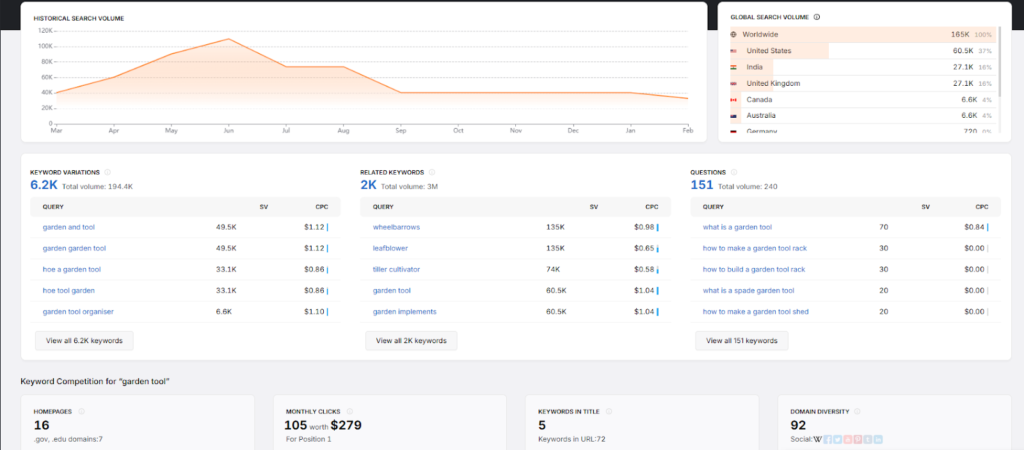
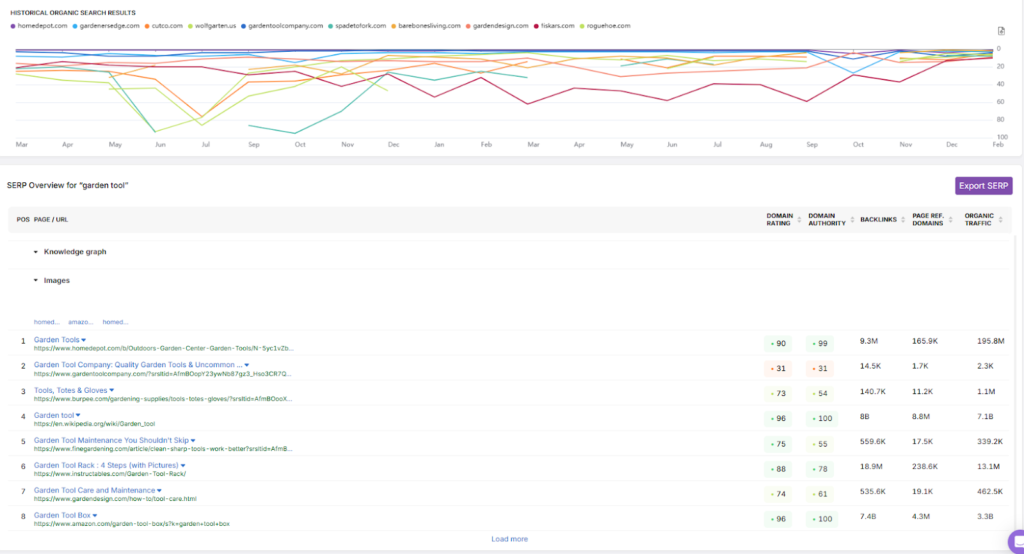
The Search Atlas Keyword tools provide complete metrics for keyword evaluation, allowing side-by-side comparison of opportunities. When prioritizing keywords, look beyond raw search volume to identify terms with the optimal combination of traffic potential, ranking difficulty, and business value based on your site’s current authority and resources.
6. Group Keywords Into Topics
Grouping keywords into topics or thematic clusters creates a strategic content framework that strengthens topical authority while preventing cannibalization (competing against yourself in search results). This thematic approach aligns with how search engines understand content relationships and topic expertise, improving rankings across related terms.
To create keyword groupings, follow the 5 steps listed below.
- Identify primary topics that represent core business areas or major subjects relevant to your audience.
- Cluster related subtopics and supporting keywords under these main themes. Examine Google SERPs for overlapping results across related queries, indicating terms that Google considers topically connected. When similar pages rank for multiple related keywords, it suggests those terms belong in the same topical cluster.
- Organize terms by search intent within each cluster, potentially mapping to different content types.
- Note relationships between clusters to identify internal linking opportunities.
- Prioritize clusters based on business value, competition level, and existing content coverage.
Use Google’s Natural Language API to analyze entity relationships and content categories that help identify natural topic groupings. Google’s Natural Language API can process existing content to extract entities and categories that form the basis of topical clusters.
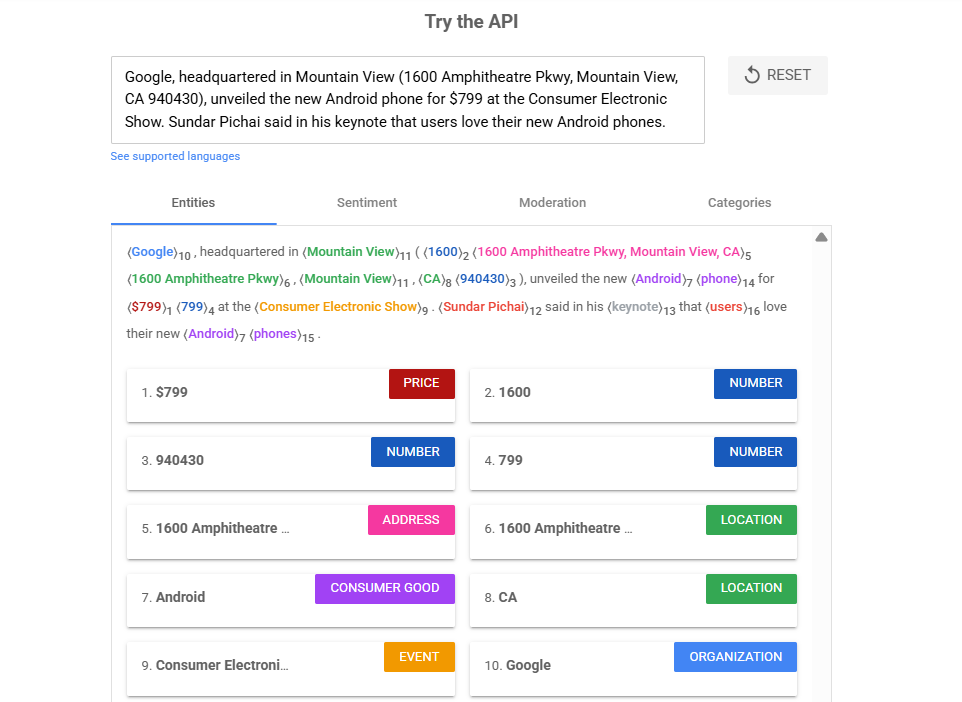
Review the People Also Ask questions that appear for your target keywords, grouping terms that trigger similar questions as they likely share topical relationships.
Use free mind-mapping tools like XMind or MindMeister to create visual representations of your keyword clusters, helping to identify hierarchical relationships between main topics and subtopics.
Well-structured keyword themes form the foundation for content planning, with each theme potentially representing a section of your website or a series of related articles.
7. Map Keywords to Content
Mapping keywords to content assigns specific target terms to existing or planned content pieces, creating a strategic blueprint for optimization. The keyword mapping process ensures each page has a primary keyword focus while identifying supporting terms that enhance semantic relevance without creating internal competition.
The tips for effective keyword mapping are listed below.
- Assign one primary keyword to each page, typically with the highest relevant search volume appropriate for your site’s authority.
- Include 3-5 closely related secondary keywords that share the same search intent.
- Ensure distinct targeting between pages to prevent cannibalization.
- Match keyword intent with appropriate content types (informational keywords to guides or articles, transactional terms to product pages).
- Consider user journey stages, mapping awareness keywords to top-funnel content and decision-stage terms to conversion-focused pages.
Once keyword mapping is complete, create a centralized document that tracks keyword assignments across your site. This point of reference prevents accidental duplication in future content development while providing a framework for measuring ranking progress and identifying content gaps that require new pages or updates to existing material.
Search Atlas Content Genius Tool streamlines this process by helping plan content around keyword clusters. The Search Atlas Content Genius Tool analyzes search results for your target terms to identify expected content elements, common questions, and related topics that should be addressed for comprehensive coverage.

8. Prioritize Keywords for Action
With a comprehensive keyword map established, the final step involves prioritizing terms for immediate action based on potential impact, resource requirements, and strategic importance. Prioritization ensures that optimization efforts offer the best return on investment, rather than arbitrarily targeting terms in alphabetical or volume-based order.
Develop a prioritization framework that considers the factors listed below.
- Quick Wins. Keywords where small improvements might yield ranking gains (positions 4-10).
- Strategic Value. Terms with high commercial value regardless of immediate ranking potential.
- Competitive Edge. Areas where competitors show weaknesses or gaps.
- Resource Efficiency. Opportunities requiring minimal content development or technical changes.
- Seasonality. Terms with approaching peak search periods that need immediate attention.
The Search Atlas SEO platform supports this prioritization through its rank tracking and forecasting tools, which help predict potential traffic gains from improved positions for specific terms. The Search Atlas Site Explorer Tool identifies existing pages that already rank but could benefit from optimization refinements, offering efficient opportunities for visibility improvements.
How to Do Keyword Research for Pay-Per-Click (PPC)?
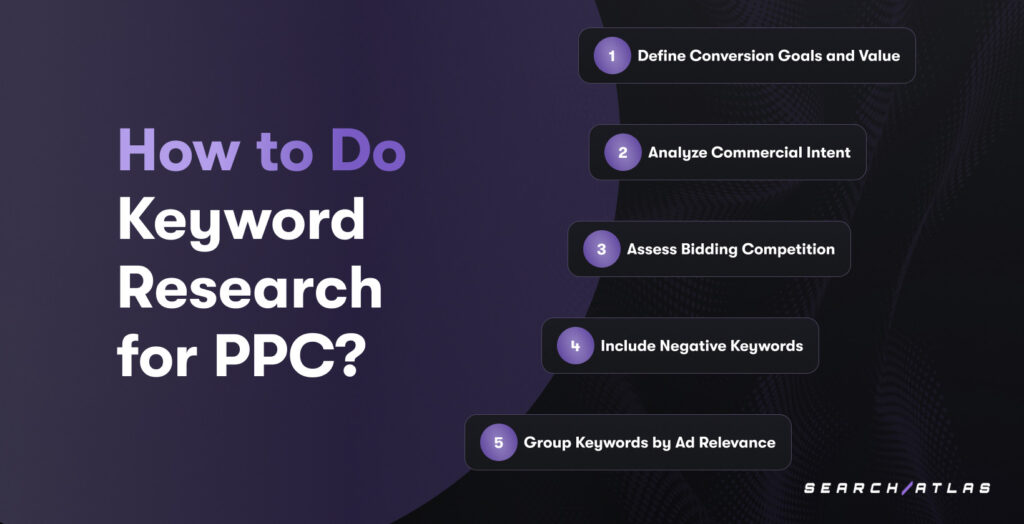
Keyword research for Pay-Per-Click (PPC) marketing shares foundational techniques with SEO research but requires additional considerations around commercial intent, bidding competition, and conversion potential. While SEO might incorporate a wide range of informational and navigational queries into a comprehensive content strategy, Pay-Per-Click keyword research focuses more on terms with clear commercial or transactional intent that justify advertising spend.
To conduct effective PPC keyword research, follow the specialized 5 steps listed below.
- Define conversion goals and value. Before selecting keywords, establish specific conversion objectives (purchases, leads, signups) and determine the maximum cost-per-acquisition that maintains profitability. This calculation provides bidding parameters for keyword selection.
- Analyze commercial intent. Evaluate whether search terms indicate purchasing readiness or research stages. Commercial modifiers like “buy,” “price,” or “near me” typically signal stronger intent and conversion potential.
- Assess bidding competition. Examine cost-per-click (CPC) estimates alongside search volume to identify terms with favorable efficiency. Sometimes, moderately lower-volume keywords offer better returns due to significantly lower costs.
- Include negative keywords. Identify terms that might trigger your ads but indicate misaligned intent, adding these as negatives to prevent wasted spend. This ongoing refinement process improves campaign efficiency over time.
- Group keywords by ad relevance. Create tightly themed ad groups where the same ad copy and landing page can address all keywords. This alignment improves quality scores and reduces costs while enhancing the user experience.
The Search Atlas Keyword Magic Tool provides essential PPC metrics, including CPC, PPCD (Pay-Per-Click Difficulty), and commercial intent indicators that help identify the most cost-effective opportunities for paid campaigns.

For those seeking to automate and optimize the PPC keyword research process, Search Atlas OTTO Google Ads offers an AI-powered solution that transforms how campaigns are created and managed. Search Atlas OTTO Google Ads is an advanced system that uses machine learning algorithms to analyze your website content, business objectives, and industry trends. The OTTO Google Ads platform streamlines PPC keyword research by automating the tasks listed below.
- Automatically clustering related keywords into tightly themed ad groups.
- Identifying high-performing keyword opportunities that match your business profile.
- Analyzing competitors’ keyword strategies to find untapped opportunities.
- Recommending negative keywords to improve campaign efficiency.
After reviewing and approving the suggested keyword strategies in your dashboard, OTTO Google Ads deploys optimized campaigns with minimal manual intervention, allowing you to focus on broader marketing strategies rather than granular PPC keyword research tasks.
What are the Types of Keyword Research?
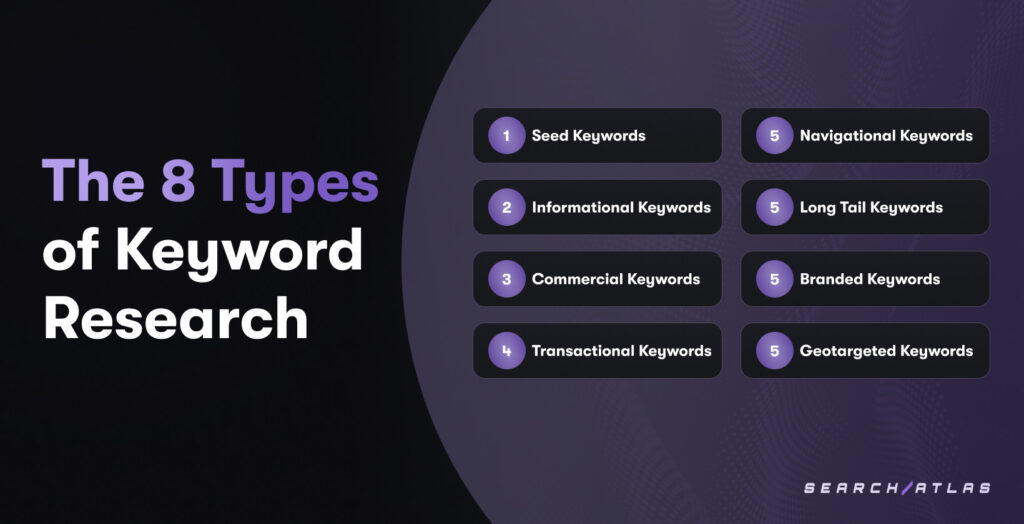
There are 8 main types of keyword research. The 8 primary types of keywords to incorporate in your research and strategy are listed below.
- Seed Keywords. Seed keywords are foundational, typically short (1-2 word) terms representing your core products, services, or topics. Examples include “running shoes,” “life insurance,” or “digital marketing.” While usually highly competitive, seed keywords help identify related opportunities through expansion and refinement.
- Informational Keywords. Informational keywords seek knowledge or answers and typically begin with question words (how, what, why) or include terms like “guide” or “tutorial.” Examples include “how to train for a marathon” or “what is cloud computing.” Informational keywords build brand awareness and establish expertise while capturing top-of-funnel audiences.
- Commercial Keywords. Commercial keywords are research-stage queries that indicate interest but not immediate purchase intent. They often include words like “best,” “top,” “review,” or “vs.” Examples include “best smartphones under $500” or “HubSpot vs. Salesforce.” Commercial keywords reach audiences evaluating options before making decisions.
- Transactional Keywords. Transactional keywords are high-intent queries that indicate readiness to take action, often including terms like “buy,” “discount,” “order,” or “for sale.” Examples include “buy iPhone 15 Pro” or “schedule dentist appointment.” Transactional keywords typically convert at higher rates and justify higher PPC bids.
- Navigational Keywords. Navigational keywords aim to find a specific website or brand, typically including brand names, product names, or branded features. Examples include “Amazon login” or “Nike Air Max.” Navigational keywords help capture traffic from existing brand awareness.
- Long-Tail Keywords. Long-tail keywords are longer, more specific phrases (usually 3+ words) have lower search volume individually but collectively represent substantial traffic opportunity with typically lower competition. Examples include “waterproof hiking boots for wide feet” or “gluten-free chocolate cake recipe without dairy.” Long-tail keywords often convert well due to their specificity.
- Branded Keywords. Branded keywords include your company name, product names, and variations with misspellings or modifiers. Examples include “Spotify premium subscription” or “Tesla Model 3.” Monitoring branded keywords helps protect your brand presence and capture high-intent traffic.
- Geotargeted Keywords. Geotargeted keywords include location information, either specific place names or “near me” modifiers, indicating local search intent. Examples include “dentist in Boston” or “coffee shops near me.” Geotargeted keywords are essential for businesses with physical locations or service areas.
What to Do After Keyword Research?
After completing keyword research, you need to take strategic action on your findings to transform data into tangible results. The post-research phase focuses on implementing, measuring, and expanding your keyword strategy to maximize search visibility and business outcomes. The 3 essential steps to take after keyword research are listed below.
1. Test Keywords by Creating Content
Put your keyword research into action by creating optimized content that targets your selected terms. Testing keywords through content creation validates your research assumptions while building organic visibility. By creating strategic content pieces for different keyword groups, you can determine which terms drive traffic and engagement for your business.
You can effectively test keywords by creating content such as optimized landing pages, blog articles, product descriptions, or resource guides that naturally incorporate your target terms. The content format should align with search intent, like comprehensive guides for informational queries, comparison pages for commercial terms, or direct solution pages for transactional searches.
2. Track Keywords Performance
Tracking keyword performance establishes a feedback loop that informs ongoing optimization efforts and helps identify new opportunities. Monitor your keyword rankings, traffic, and conversion metrics to evaluate which terms are delivering the most value. This process requires establishing baseline positions before implementing changes to measure improvements accurately.
You can track keyword performance by using rank monitoring tools like Google Search Console or Search Atlas to check position changes, analyze organic traffic patterns through analytics platforms, and connect keyword visibility to actual business outcomes like leads, sales, or other conversion metrics. Pay special attention to metrics that indicate business impact, like organic sessions, conversions, and revenue attributed to specific terms.
3. Scale Keyword Strategy
As initial keyword strategies prove successful, scaling these approaches requires expansion into related topics, markets, or audience segments. The keyword scaling process builds on established successes while growing search visibility across broader opportunity areas. To effectively scale your keyword strategy, leverage the 5 steps listed below.
- Expand content development into related topical areas identified during initial keyword research but not prioritized for immediate action.
- Refine and update existing content based on performance data, enhancing pieces that show ranking potential but haven’t reached optimal positions.
- Adapt successful content formats and approaches to new keyword targets, replicating patterns that have demonstrated ranking effectiveness.
- Consider geographic expansion for location-based businesses by creating optimized content for additional service areas.
- Explore emerging topics and trends related to your core offerings, establishing early visibility in growing search areas before competition intensifies.
Scaling a keyword strategy requires maintaining quality and relevance while increasing production volumes. This measured expansion builds on established authority in core topics while strategically growing visibility across related opportunities that align with business objectives and audience needs.
What Are the Best Keyword Research Tools?
Best keyword research tools provide comprehensive data on search volume, competition, trends, and user intent. The best SEO keyword research tools combine extensive databases with intuitive interfaces that streamline the research process while delivering actionable insights. These tools vary in functionality and pricing, with options available for beginners and advanced SEO professionals.
The best keyword research tools for SEO and PPC include both Google’s free offerings and comprehensive SEO platforms. The best keyword research tools are listed below.
Google Keyword Planner. Google Keyword Planner provides search volume ranges and competition levels primarily for PPC planning. While designed for advertisers, it offers valuable insights for organic keyword research, especially when combined with other tools. The primary limitation is that it shows broad volume ranges rather than specific numbers unless running active ad campaigns.
Google Search Console. Google Search Console shows which queries already drive traffic to your site, including positions, impressions, and click-through rates. This data reveals opportunities to improve existing rankings and identifies related terms to expand content around. The historical performance data helps validate keyword opportunities based on actual results rather than theoretical potential.
Google Trends. Google Trends displays the relative popularity of search terms over time, revealing seasonal patterns and emerging topics. While it doesn’t provide absolute search volumes, the relative comparison and geographic breakdown help identify regional interests and growing opportunities before they appear in other tools.
Search Atlas SEO Software Platform. Search Atlas delivers comprehensive keyword research capabilities through its AI-powered suite of keyword research tools. The Search Atlas Keywords Research Tool feature provides foundational discovery of relevant search terms with complete metrics on volume, difficulty, and intent.
The Search Atlas Keyword Magic Tool expands this by identifying semantic relationships and suggesting related variations with deep SERP analysis. For competitive insights, the Search Atlas Keyword Gap Tool uncovers opportunities by comparing your domain against competitors to find valuable terms you’re missing.
The Search Atlas Keyword Rank Tracker Tool monitors performance with daily position updates, SERP feature tracking, and competitive movement alerts. The Search Atlas Keyword Rank Tracker Tool ensures complete keyword research capabilities from initial discovery through implementation and ongoing performance monitoring.
Search Atlas OTTO Google Ads transforms PPC keyword research with AI-driven automation that analyzes your website and business objectives to identify the most relevant, high-converting keywords. Search Atlas OTTO Google Ads automatically structures these keywords into tightly themed ad groups, suggests negative keywords to improve efficiency, and generates optimized ad copies tailored to each keyword cluster. This streamlined approach eliminates hours of manual keyword research while potentially improving campaign performance through data-driven keyword selection.
Is It Hard to Be a Keyword Researcher?
No, being a keyword researcher is not hard, but it does require specific analytical skills and marketing knowledge that evolve with practice. The keyword research basics can be learned relatively quickly through online resources, tutorials, and practical applications. Most beginners can grasp core concepts like using research tools, interpreting basic metrics, and identifying obvious keyword opportunities within a few weeks of dedicated study.
The true challenge of becoming a keyword researcher is developing strategic thinking and pattern recognition abilities. As you learn keyword research more deeply, you’ll need to identify commercial intent behind search terms, recognize semantic relationships between keywords, and translate technical metrics into actionable recommendations.
For beginners, resources like Google’s SEO starter guide, industry blogs, and Search Atlas YouTube tutorials provide accessible entry points to build foundational skills. The learning curve accelerates when applying these concepts to real projects, allowing researchers to see how their keyword selections translate into actual content performance.
What is the Difference Between Keywords and Topics in SEO?
Keywords are specific search terms or phrases that users type into search engines, representing the exact language used to find information, while topics are broader subject areas that encompass multiple related keywords organized around a central theme. Keywords are granular, often focused on particular aspects of a subject, and typically contain specific modifiers or qualifiers. For example, “best running shoes for flat feet” or “how to fix a leaking bathroom faucet” are keywords that target precise search queries.
Topics focus on the underlying subject matter rather than specific phrases, creating a more comprehensive approach to content organization. For example, “running shoes” would be a topic that includes numerous related keywords like “marathon training shoes,” “lightweight running footwear,” and “stability running shoes for overpronation.”
The goals of keyword-focused SEO traditionally emphasized ranking for specific search queries by creating dedicated pages optimized for exact match terms. Topic-based SEO aims to establish authoritative coverage of subject areas by creating comprehensive content that addresses all aspects of a theme. Rather than targeting isolated keywords, topic optimization focuses on semantic relevance, entity relationships, and overall subject matter expertise.
What is the Difference Between Keyword Research and Market Research?
Keyword research focuses specifically on analyzing search queries to understand how people look for information, products, or services online. Market research, on the other hand, is a broader discipline that studies consumer behavior, preferences, needs, and trends to understand target audiences and market dynamics. Market research encompasses multiple data collection methods, including surveys, focus groups, interviews, and competitive analysis, to gain comprehensive insights into market conditions. The goal of market research is to identify market opportunities, understand customer segments, and inform the overall business strategy.
While keyword research examines how people search for solutions, market research investigates why they need those solutions in the first place. Keyword research might reveal that “affordable meal delivery services” has a high search volume, but market research would explain the underlying factors driving this demand, perhaps busy work schedules, desire for convenience, or changing dietary preferences among certain demographics.
What to Know About Keyword Research Besides SEO Content?
Keyword research is a foundational strategic process that identifies how people search for information, products, or services online by analyzing search terms, volumes, and intent patterns. While SEO content creation focuses on producing optimized articles, blog posts, and pages that target specific keywords to rank high in search results, keyword research has much broader applications across digital marketing.
The relationship between keyword research and SEO content is synergistic. Keyword research provides the data foundation that informs an SEO content guide, while content serves as the vehicle that puts keyword strategy into action.
What to Know About Keyword Research Besides On-Page SEO?
Keyword research discovers and analyzes search terms that reveal user intentions, interests, and behaviors across different journey stages. While on-page SEO focuses on optimizing individual page elements like titles, headings, and body content to target specific keywords, keyword research influences much broader marketing and business strategies, exceeding these technical optimizations.
The connection between keyword research and on-page SEO highlights how foundational keyword insights drive tactical page optimizations and strategic business decisions.


